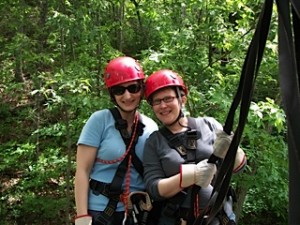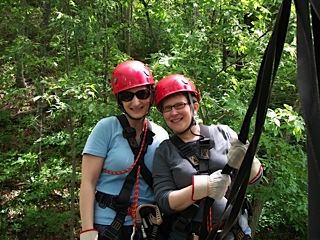
Last week, Brenda Bos spoke with ELM’s new Program Director Rev. Jen Rude to talk about her new role.
by Brenda Bos, ELM Communications Team
Congratulations on the new job. It’s exciting to see Extraordinary Lutheran Ministries expand our staff!
Thanks. Knowing when to expand is a tricky thing. The ELM board had been having a serious conversation for over a year about adding a staff position dedicated to our programs. Our three main programs are all about three times the size they were just a few years ago! We’d started feeling like we were just maintaining rather than growing. By having someone around to focus on the programs, Amalia can spend more time getting the word about ELM out to more and more people. The timing worked out to be right for ELM and me this fall. I’m really excited to be connecting back with the Lutheran church and I love that Extraordinary Lutheran Ministries is largely a grassroots organization with committed volunteer leaders.
You were working in The Night Ministry in Chicago. For those who don’t know what The Night Ministry is, it’s working mostly with the homeless in urban areas, right?
Yes. I served at The Night Ministry for eight years (during part of that time also serving a local church). I was working with teenagers and young adults who are experiencing homelessness, I was outside two nights a week on the streets doing outreach. There is a huge overlap with LGBTQ youth and homeless youth. I worked a lot on relationship building, talking to people in crisis, and being a constant presence both in challenging times and joyful times. One of the parts of the work I loved the most was getting young people involved in leadership development, peer to peer outreach and support and the watching them be amazed at what they are capable of.
Interesting that ELM does a lot of that same relationship building, but in the LGBTQ pastor and seminarian world, rather than youth on the streets.
Exactly. I’m excited to really get to know more deeply all of the folks who are involved with ELM. One of the things I love to do is help people figure out what their gifts are, what their skills are, and what brings them joy. In this new role at ELM, I can support our pastors and seminarians behind the scenes so they can go live into their call to serve God and serve the church. Howard Thurman said, “Don’t ask what the world needs. Ask what makes you come alive, and go do it. Because what the world needs is people who have come alive.”At Extraordinary Lutheran Ministries, I want to partner with people to discern what makes them come alive – and then work together to make it happen!
How did you end up in ordained ministry?
Well, I grew up in the Lutheran church and I’d thought about being a pastor. My dad, grandpa and uncle are all pastors. Two weeks into freshman year I fell for a girl and came out as queer. I had this moment where I realized being a pastor was no longer possible for me. So I told myself I was going to be an academic – like, a religion professor. Yah, I’m not smart enough for that! But, I thought about going to seminary and visited Pacific Lutheran Theological Seminary in Berkeley, where I met (historic ELM rostered) Pastor Jeff Johnson. It was one of the first moments that I recognized there were people who lived both as openly LGBTQ people and as pastors doing ministry. It was the first time that I realized that this could be possible for me, too.
I admire those early pastors who came out, but there were many LGBTQ pastors who stayed in the closet. How do we make sense of all those different stories now?
I think the first thing is just to honor that we all chose a path and we all took different ways, and that that’s OK. I think in the past there was a lot of judgment about you didn’t do it this way, or you didn’t do it that way. We all did the best we could. Now it’s all about building connections together. I would have not gone through candidacy as openly as I did if I didn’t have mentors from the historic ELM roster along the way who gave me advice about how to do it with integrity for me. It is a pretty scary process to go through candidacy and I had people to support me and help me find language and even to help me feel empowered to say to candidacy committees “That’s not an appropriate question.”
There are people who are the only openly LGBTQ pastor in their state and they need to be connected with people who are in places where there is a lot of support. I think we give each other strength. We also need to honor the differences between being queer in South Carolina and being queer in Chicago. Hopefully the community as a whole has moved past judgments about the past and we are more concerned with how to live into God’s future together. Today we stand in a long line with those who risked a lot, and at times, suffered a lot. Part of the reason there is so much exciting LGBTQ stuff happening in the Lutheran church today is because of the work people of faith have been doing for decades.
And Extraordinary Lutheran Ministries is thinking about its prophetic role to strengthen the entire ELCA. What have you got in mind?
I think one of these new gifts is the Ministry Engagement Program. How do we connect with allied congregations, not just pastors and seminarians, but congregations and ministries doing radical public work? It can also be isolating to be the only radical congregation in your neighborhood. There are incredible congregations and ministries who have been way ahead of church policy. How do we pull those churches together and what is the work of justice and compassion that is now before us now?
What do you think the LGBTQ community has to offer the ELCA?
Lutherans are all about living in the paradox. Not black and white, not one thing or another, but “both/and” and “now and not yet.” ELM seeks to live in this gray area. We have a diverse community. By definition, LGBTQ is not one single identity and we are finding ways to live as faithful people in the beauty and challenges of such diversity. I think of the communion table. We’re all invited, everyone sits at the same table, there is food enough for everyone, and Christ is our host. Our job is to see and engage all who are at the table and to think about who is not at that table. Who am I missing out on sharing a meal with? Who is going hungry? And then we realize that actually there is plenty of room and the food keeps multiplying, and God’s table grows – and we grow.


